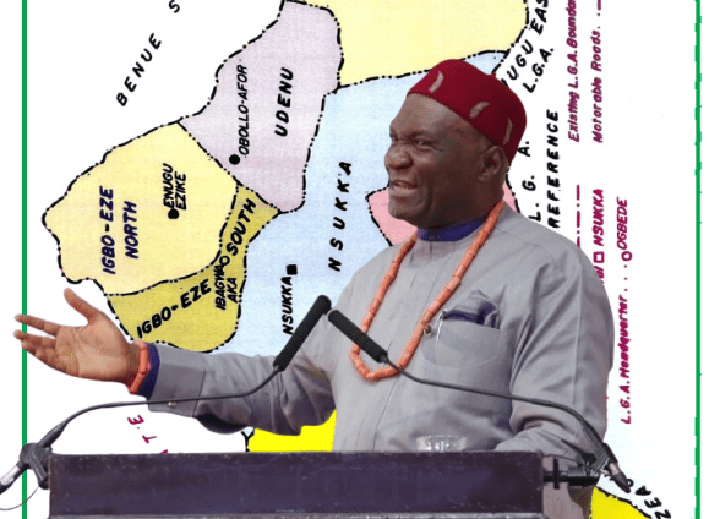
This post has already been read at least 11840 times!
The long-standing agitation for the creation of Adada State took center stage at the South East Zonal Public Hearing on the review of the 1999 Constitution in Enugu, as the Adada State Movement delivered what many observers have described as the most compelling and constitutionally grounded case before the Senate Committee.
Former Minister of Information and President General of Ohanaeze Ndigbo Worldwide, Chief John Nnia Nwodo, led the delegation, delivering a masterful presentation that earned widespread admiration and visibly captivated the senators and dignitaries in attendance.
Drawing on historical records, constitutional provisions, and demographic data, Nwodo passionately argued that Adada—carved from the present Enugu State—is the most qualified and deserving of all proposed new states in the South East.
In a press statement signed by Mr. Ike Abonyi, Media Director of the Adada State Movement, the event was described as a significant milestone in the decades-long pursuit of justice and equity for the people of the old Nsukka Province.
Contents
A Demand Backed by History and Constitutional Compliance
Nwodo told the lawmakers that the Adada State Movement has met all constitutional requirements for state creation as enshrined in Section 8(1) of the 1999 Constitution. He presented signed endorsements from the relevant elected officials—ranging from local government councillors to members of both the Enugu State House of Assembly and the National Assembly—affirming unified support for the state creation request.
“Section 8(1) of the Constitution clearly states the process, and we have fulfilled it. All legislators in the affected areas have signed in support,” Nwodo said. “Adada State is not only viable and justified by equity, but it has also been consistently recommended over time—including by the 2014 Constitutional Conference under Justice Idris Kutigi.”
Tracing the history of the demand to the immediate aftermath of the Nigerian Civil War in 1970, Nwodo stressed that Adada is the most agitated and yet the most unjustly denied state in the country.
Demographic and Political Injustice
Highlighting the inequities suffered by the Nsukka zone, Nwodo lamented that despite constituting over 54% of Enugu State’s population, the Adada zone has only six out of the 17 local government areas. The region’s lone senator represents more constituents than the two senators representing the rest of the state combined, a situation he described as a “travesty of justice.”
He further noted that the southern part of Igbo land currently has three states—Imo, Abia, and Anambra—while the northern Igbo heartland remains with only two: Enugu and Ebonyi. “Equity demands that the next state in the South East must be Adada,” he declared.
“We are not asking for charity. We are demanding justice and fairness,” Nwodo added. “We have oil and gas reserves, fertile land for agriculture, navigable waterways, one of the best universities, and an educated population ready to manage its own affairs.”
He also pointed to the unjust redistricting that placed one of the seven core Adada local governments under Enugu East Senatorial Zone, thereby undermining the political cohesion of the proposed state.
Historic Consistency and Nationwide Support
According to Nwodo, the proposal for Adada State has been championed in several political fora and consistently endorsed by pan-Igbo stakeholders. He referenced the resolution reached during Governor Achike Udenwa’s administration in Imo State where the entire Igbo political and traditional leadership agreed that Adada should be the next state to emerge from the region.
“The 2014 National Conference recommended only Adada State for creation in the South East. No other proposal has enjoyed such singular recognition,” Nwodo reminded the audience.
Ugwu and Ezea Lend Strong Support
Adding his voice to the strong advocacy, Chairman of the Adada State Movement, Chief James Ugwu, recounted that the first formal request for Adada was made in 1970 to then Head of State, General Yakubu Gowon. He emphasized that state creation would correct not only internal imbalances within the Igbo geopolitical structure but also external ones, noting that the South East remains the only geopolitical zone in Nigeria with five states.
“With Adada, northern Igbo (Wawa people) would have three states, matching the three in the south. And Nigeria would finally give the South East a sixth state, aligning it with the rest of the country,” Ugwu argued. “The next step, having fulfilled Section 8(1), is for the National Assembly to transmit our request to INEC for a referendum.”
Ugwu also commended Enugu State Governor Peter Mbah, saying his administration’s performance has inspired confidence in the region’s readiness for effective self-governance.
Senator Okey Ezea, representing Enugu North Senatorial District, lent weighty legislative backing to the movement. He affirmed that Adada is “unarguably the only province in Nigeria yet to be made a state” and asserted that the proposal has fully met the constitutional criteria for approval.
“Adada is the only proposed state in the South East that has fulfilled Section 8(1)(a) of the 1999 Constitution,” Ezea confirmed, urging the National Assembly to expedite the next steps toward realization.
A Watershed Moment for a Long-Suffering People
The Adada State Movement’s presentation at the Senate hearing was more than a constitutional argument—it was a heartfelt plea for justice long overdue. With passion, facts, and broad-based political backing, Chief Nwodo and his delegation elevated the Adada cause to the national stage in a manner observers say will be difficult to ignore.
As the Senate continues its zonal public hearings on constitutional review, the Adada State Movement has left no doubt that its demand is not only just but ripe for fulfillment.
This post has already been read at least 11840 times!




